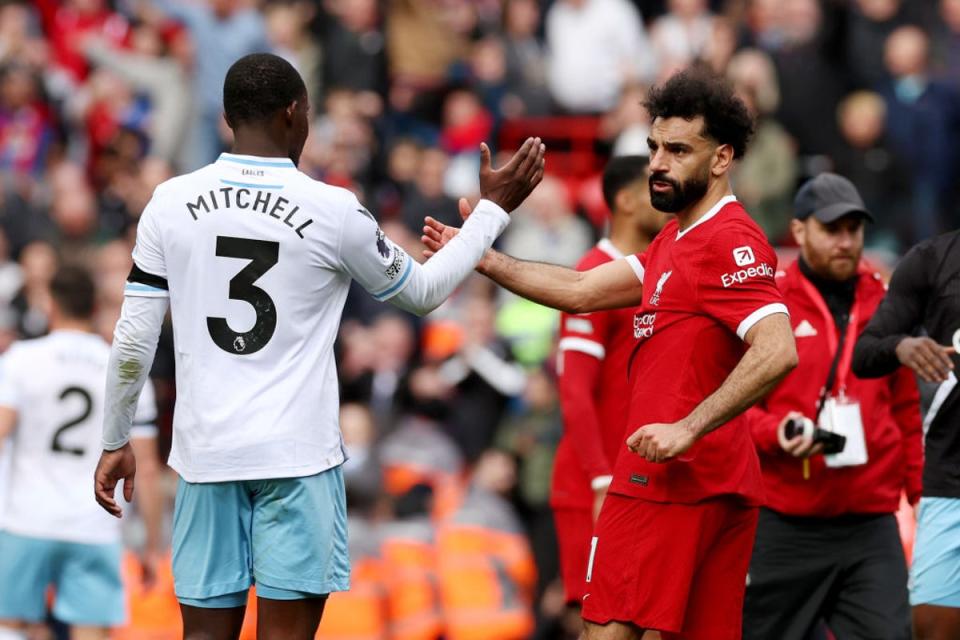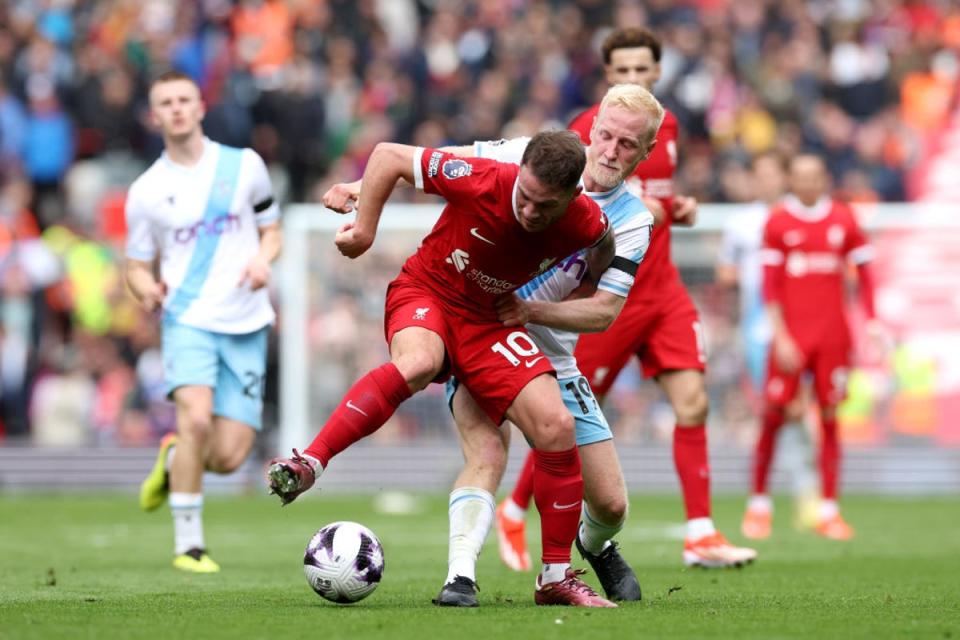How a defeat to Man United caused Liverpool to unravel in the title race
In another world, the turning point in Erik ten Hag’s reign at Manchester United came in defeat to Liverpool. But instead of the beginning of the end for him, Jurgen Klopp’s victory lap has been stripped of the wins that could have led to silverware. It may be of some solace to United in their torrid campaign but, in between tripping themselves up, they have caused Liverpool to stumble.
A 4-3 in the FA Cup ended the quest for a quadruple and, Klopp said, “was like a catastrophe because we were that good and lost it anyway”. A 2-2 in the Premier League has been followed by twin Liverpool defeats at Anfield, to Atalanta and Crystal Palace on Sunday. “I am not sure how we dealt with the United games particularly helped,” said Klopp.
If it suggests his mentality monsters lost their nerve in a pivotal week, Liverpool’s unravelling has felt a cause of fatigue and form, of a previously prolific side proving poor in both boxes, of a team who, as players returned, are in theory as strong as they have been for months but who have just delivered their two worst results of the campaign.
Andy Robertson, a rare exception after his dynamic cameo against Sheffield United and goal-line clearance to deny Palace, highlighted issues at either end. “We are struggling to keep clean sheets right now,” he said. They have none in nine games, three in 19, as Liverpool’s formula of conceding but outscoring opponents has come to look flawed. The problem with getting 27 points from losing positions is that it entails losing to begin with. Twice in four days, they could not turn defeat into victory.

“The boys in front of goal have to do better,” added Robertson. “But the boys at the back, as defensive unit as a whole, we have to do better.” Klopp’s analysis of the winner an unmarked Eberechi Eze scored – “that cannot happen” – could be applied to many a goal they have conceded. Meanwhile, a team who have scored 127 in all competitions have none in their last two games. Across the last three, they have two goals from 68 shots: as one was a Mohamed Salah penalty, it is reduced to one from 67 attempts in all other phases of play.
The numbers reflect upon individuals in different ways. Salah has not scored in four matches in open play; he has not recaptured his autumnal brilliance. Darwin Nunez’s entertaining erraticism in front of goal can be endearing when others are scoring, but is frustrating when they are not and Klopp has taken him off in three consecutive matches. Diogo Jota’s movement and finishing render him unique in this squad but arguably, and like Trent Alexander-Arnold, Liverpool needed each fully fit two weeks ago so he could contribute fully now.
Something similar may be said of Curtis Jones, who was in the form of his life when injured, but who has not returned at the same level. “Kind of a rhythm,” mused Klopp, sensing Dominik Szoboszlai has also lacked it on his own return. In every department, there is the sense Liverpool should be getting stronger, but are actually weaker than they were.
In midfield, injuries had left Wataru Endo and Alexis Mac Allister overworked. Perhaps each is toiling now: the Argentinian had produced superlative performances until the last two, but the Japanese is now starting to resemble the newcomer who struggled in autumn rather than the revelation who starred in winter. “Did Wataru and Macca play now a little bit too much in the last few weeks? Maybe,” Klopp said. “They were the two most-used, especially Macca.”

Without that energy, Palace had so much space in midfield it was as though they were playing against Ten Hag’s United. “Against the ball we were an absolute machine,” added Klopp, with the emphasis on the past tense. Liverpool may have lost their physical edge, exhausted by a half-century of high-energy games. “Crystal Palace had far too many football moments where we ran in the wrong direction,” said Klopp, summing up how Liverpool lost their way.
All of which exposed the defence. Kostas Tsimikas had a shocking 45 minutes against Atalanta. Joe Gomez, terrific until recently, has tailed off. Ibrahima Konate has been unreliable when Liverpool needed him to be more consistent and solid; even the ultra-dependable Virgil van Dijk has had a tough week.
Go back a little further and it seemed that, no matter who was missing, Liverpool could win anywhere with anyone. There was a time to marvel at the success of the intrepid understudies. But extended exposure to first-team football can be perilous. For Jarell Quansah, Old Trafford was a game too far, when he was at fault for Bruno Fernandes’ goal. For Caoimhin Kelleher, it was Atalanta, when he erred for two goals. For Conor Bradley, recent performances have not been as vibrant and flawless as they were in January and February.
It amounts to a squad where, suddenly, few are playing well; at a time of a season when Klopp teams often surge onwards. The previous time they went for a quadruple, in 2022, they peaked in April. Now the majority – including Klopp, whose team selection against Atalanta now looks still more misguided – looked at their best in earlier matches. Perhaps United got in their heads. But Liverpool, who went to Old Trafford in the FA Cup with three defeats in 36 games, have now lost three of six. And United may have helped knock them out of the Europa League and the title race.

